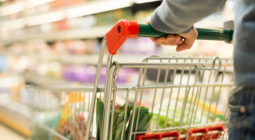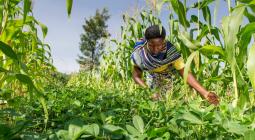From trash to table: will upcycled food save the planet?
Nearly 40% of all food grown annually in the US goes unsold or uneaten. These companies are getting salty about food waste
When Kaitlin Mogentale was studying environmental science at the University of Southern California, she watched a friend juice a carrot and noticed the waste it produced – and wondered what was happening to all of the pulp from Los Angeles’s juice shops. She later learned that most of it was being sent to landfills, where food waste contributes to more methane emissions than any other landfilled matter.
“I was a college student, very young and naive, and I think that’s the recipe you need to get into the business,” said Mogentale, who founded Pulp Pantry, makers of fiber-filled Pulp Chips, which are created from the leftover pulp from cold-pressed juice. Mogentale said the company goes to juice-production facilities and collects 10,000lb (4,536kg) of pulp at a time – one day’s worth of leftovers – then transfers it in temperature-controlled trucks back to its manufacturer to make the chips.
She started with chips because they were an easy way to “bring fruits, vegetables and fiber to the nine in 10 who don’t get their servings daily”. Sold in about 600 stores across the west coast, including Whole Foods and Erewhon, Pulp Pantry says it has saved 174,165lb of nutritious veggies since coming to market in 2020.
Pulp Pantry, along with other food brands such as Renewal Mill, Climate Candy, Upcycled Foods, Rind and Barnana, are part of a new crop of businesses gaining popularity for “upcycling” foods created from surplus food, edible food waste and byproducts. These sustainability-minded startups are producing everything from climate-friendly baking mixes and nutritious snack foods to plant-based candy, carbon-neutral pasta sauces and more.
The rise in popularity of upcycled food brands coincides with a massive food-waste problem. In the US, nearly 40% of all food grown annually – the equivalent of 145bn meals – goes unsold or uneaten. Valued at $473bn, which is roughly 1.8% of the US’s GDP, food waste has the same climate footprint as the entire US aviation industry, including the military, according to ReFED, a leading food waste research organization.
“We throw something in the trash bin and we don’t see where it goes,” said Mogentale. “We don’t really have any responsibility towards our own footprint when it comes to food waste, but at the same time, each of our own individual actions lead to this more collective problem, which is we are the biggest wasters of food at home.”
The Upcycled Food Association, or UFA, which debuted in 2019 with just nine companies, defines upcycled foods as utilizing ingredients that “otherwise would not have gone to human consumption, are produced using verifiable supply chains, and have a positive impact on the environment”.
In 2021, the upcycled food products market size was valued at $53.7bn, and it’s estimated to reach $97bn by 2031, according to Allied Market Research.
In 2021, UFA launched the Upcycled Certified program, the world’s first third-party certification program for upcycled products and ingredients. One study found that more than 50% of consumers had increased intent to buy products with the Upcycled Certified mark, signifying acceptance and demand from shoppers. Today, there are 93 companies with more than 480 products and ingredients certified, and UFA estimates that these products have diverted an average of 390,000 tons of food waste annually for the last three years.
One of those companies is Matriark Foods, which launched a line of pasta sauces in 2023 made from upcycled tomatoes and recently launched a meal for food banks made from upcycled farm surplus and fresh-cut remnants that would otherwise have gone to waste. “It seems corrupt not to do something to expand the use of things that have already been grown to feed,” said the Matriark Foods CEO, Anna Hammond. “I’ve never met a farmer who wants to waste – they care a lot about what they’ve grown.”
Food-waste experts say that upcycling startups will not be able to solve the food-waste crisis alone, especially since nearly half of waste occurs in residences, followed by farms, manufacturing, food service and retail, but that their existence could help educate consumers.
“I think [these brands] are an excellent addition because there’s no one silver bullet for food waste, so jumping in at any point is great,” said Brian Roe, who heads the Ohio State University’s food waste collaborative. “[Upcycled brands] help consumers think about the issue and become more cognizant of the issue. That’s even better because most of the waste occurs at the residential level.”
Experts say a mix of food and environmental policy initiatives, optimization of the supply chain, education, strengthening of food rescue and recycling, and collective action will be needed to truly transform how the US deals with food waste.
Roe pointed to South Korea, which banned food scraps from its landfills in 2005, as “the most interesting end of the spectrum internationally”. Its residents are required to separate their waste and pay a small tax on the amount that’s created, and local governments built hundreds of facilities for processing food waste.
“There’s been some rigorous analysis suggesting the tax doesn’t cost a lot, maybe $20 a year, but it’s led to a significant 20% reduction in the amount people were wasting,” said Roe. “The amount they were saving by buying less food was greater than the tax they were paying, so there was a net profit for consumers in South Korea.”
The Biden-Harris administration recently released a Draft National Strategy for Reducing Food Loss and Waste, and the EPA and the United States Department of Agriculture set an ambitious goal in 2015 to reduce food loss and waste by 50% by 2030. After addressing comments received on the draft strategy, the administration will begin implementing the final strategy later this year.
In the meantime, startups that reduce the amount of waste we create are trying their best to help.
Chef Adam Kaye, who co-created the wastED pop-up restaurant series, and Jeremy Kaye, who helped create a new sustainability model at Patagonia, founded the Spare Food Co to bring climate-friendly food to people. Last fall, the brothers launched Spare Starter, a six-crop veggie-blend recipe booster for the food service industry that can be used in sauces, stews, tacos and more.
“Spare Starter is an end-to-end solution that reduces food waste at each point along the food supply chain: at the farm, the processor, in the kitchen and by mitigating the need for overproduction that’s a primary cause of consumer waste in dining halls, restaurants and at events,” said Jeremy Kaye.
The company also makes an award-winning beverage, Spare Tonic, that uses the fresh whey that’s a co-product of the Greek yoghurt manufacturing process and is full of the same probiotics and naturally occurring protein from the original milk product. Later this year, they plan to introduce Spare Burger, a blended beef burger made of 30% surplus vegetables.
“It’s simply a better, plant-forward burger for chefs, for burger lovers and for the planet,” said Jeremy Kaye. “Meat accounts for nearly 60% of all greenhouse gases from food production, and the evidence is clear that we need to reduce the amount of meat consumed by 30% to 70% to avoid a climate disaster. We can probably all agree that the general population is not going to turn vegan overnight.”
Food waste won’t be solved overnight, either.
“This is a time in the history of food systems that’s more crucial than any other time,” said Matriark’s Hammond, who believes the country needs policy, small food companies innovating and large food companies collaborating to help them scale in a short period of time.
“All food should reach its highest purpose, which is feeding people.”
Cover photo: Pulp Chips, right, are created from the leftover pulp from cold-pressed juice. Composite: The Guardian/Getty Images/Pulp Pantry



